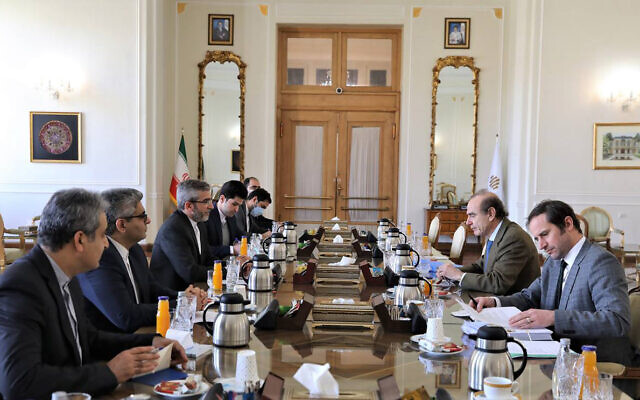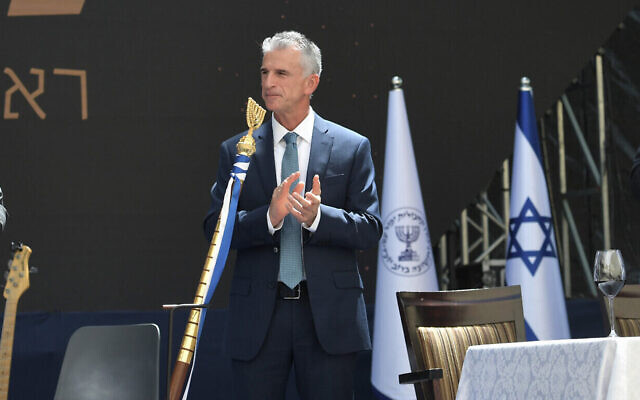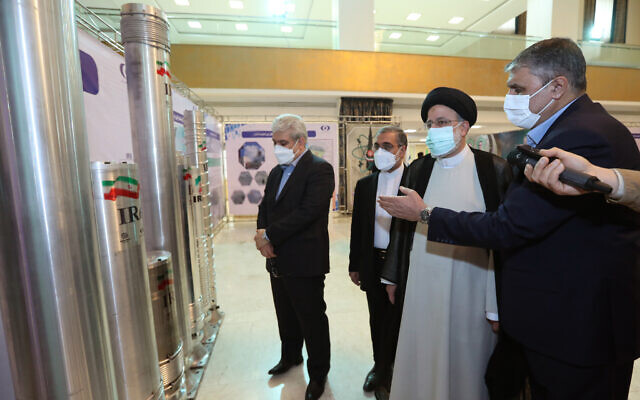Supporters of renewed JCPOA say it buys army time to prepare for more extensive strike on Iran and deal with other regional threats, but they appear to be minority among leadership

Senior defense officials were at odds over Israel’s stance on talks aimed at reviving the Iran nuclear deal, according to an unsourced report Sunday in Hebrew-language media.
According to the Ynet news site, several Israeli generals, including the chief of Military Intelligence, have begun to support a return to the 2015 accord between Iran and world powers, against Israel’s official policy.
The report was published as world powers prepare to reconvene talks in Vienna to revive the Joint Comprehensive Plan of Action after months of deadlock.
Officially, Israel is fiercely opposed to a return to the 2015 deal, which it campaigned against at the time of its signing, viewing Iran as untrustworthy and unable to keep its commitments.
Successive Israeli governments have warned for decades that Iran seeks to build a nuclear weapon.
But senior intelligence officials now believe that a bad agreement is preferable to no agreement at all, as it gives Israel time to prepare for extensive military responses against Iran, Ynet said.
The past year has seen the Israel Defense Forces ramp up its efforts to prepare a credible military threat against Iran, with dozens of Israeli Air Force fighter jets conducting air maneuvers over the Mediterranean Sea simulating striking Iranian nuclear facilities earlier this month.
The officials in support of a return to the deal listed by the news site were the head of the IDF’s Military Intelligence Directorate, Maj. Gen. Aharon Haliva; Brig. Gen. Amit Sa’ar, who leads Military Intelligence’s Research Division; Brig. Gen. Oren Setter, the head of the IDF’s Strategic Division; and Brig. Gen. Tal Kelman, the military official in charge of Iran affairs.

The report said the intelligence generals believed Defense Minister Benny Gantz also supports a return to the deal. Gantz has previously said he supports a “broader, stronger and longer” accord.
But against them, and supporting Israel’s official stance against the deal, were senior members of the Mossad, including chief of the spy agency David Barnea, and the chief of the IDF, Aviv Kohavi, the report said.
Ynet said the Mossad maintains that a deal is bad for Israel and at most would only buy it two and a half years of Iran not advancing its nuclear capabilities. Separately, the report said the Mossad believed that publicizing the positions of the intelligence officers was intended to influence incoming prime minister Yair Lapid, to support a return to the agreement.

The Military Intelligence directorate told Ynet that its positions regarding the Iranian nuclear deal had not changed since Haliva took his post in October 2021.
The original 2015 agreement gave Iran sanctions relief in exchange for curbs on its nuclear program, but the US unilaterally withdrew from it in 2018 under then-president Donald Trump, who reimposed heavy economic sanctions.
That prompted Iran to begin rolling back its own commitments and enrich uranium to a purity level only a short technical step away from what is needed to produce atomic weapons.

Talks on reviving the Iran nuclear deal, which have been stalled for three months, are expected to resume within days, the EU’s foreign policy chief Josep Borrell said Saturday during a surprise visit to Tehran.
Israeli officials charge that if economic sanctions are again lifted, Iran would send even more money to terror activities against Israel, and to its proxies throughout the Middle East, including on Israel’s northern border.
As reported by The Times of Israel
